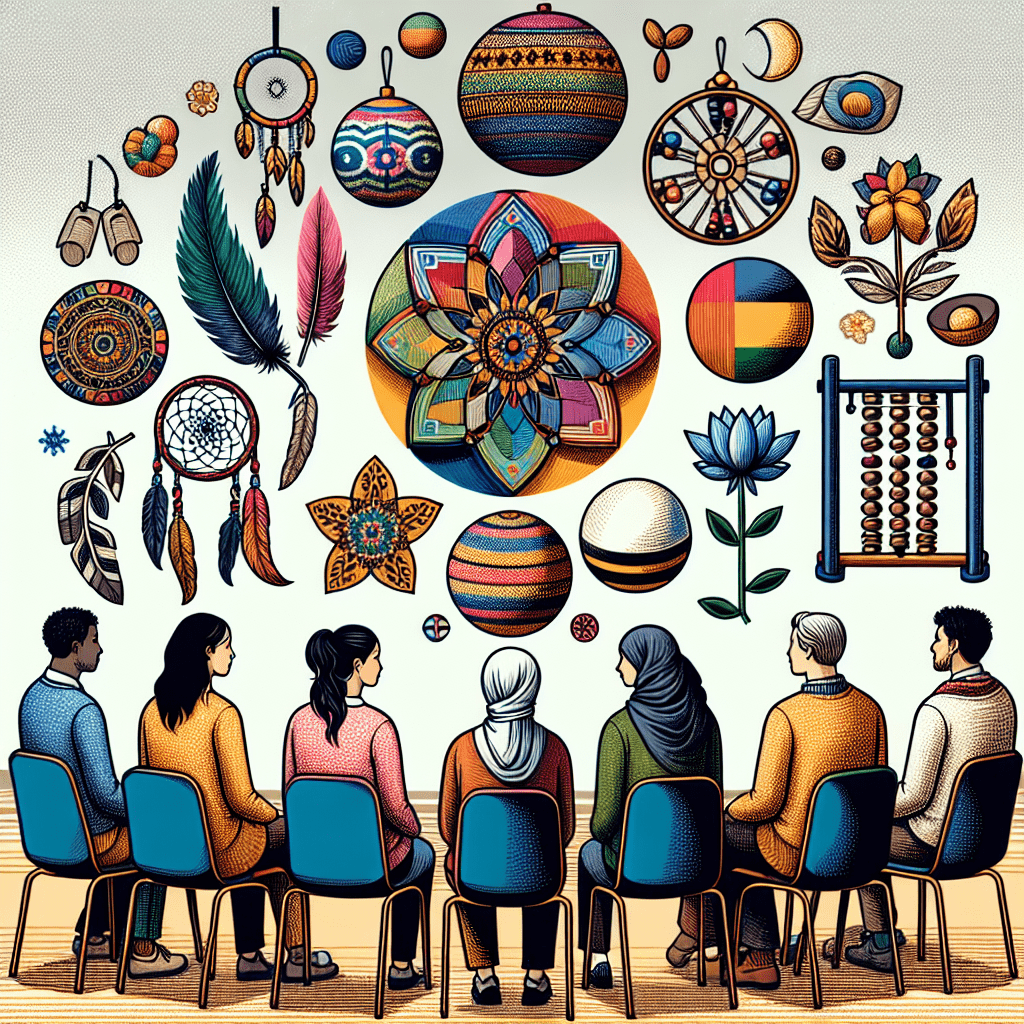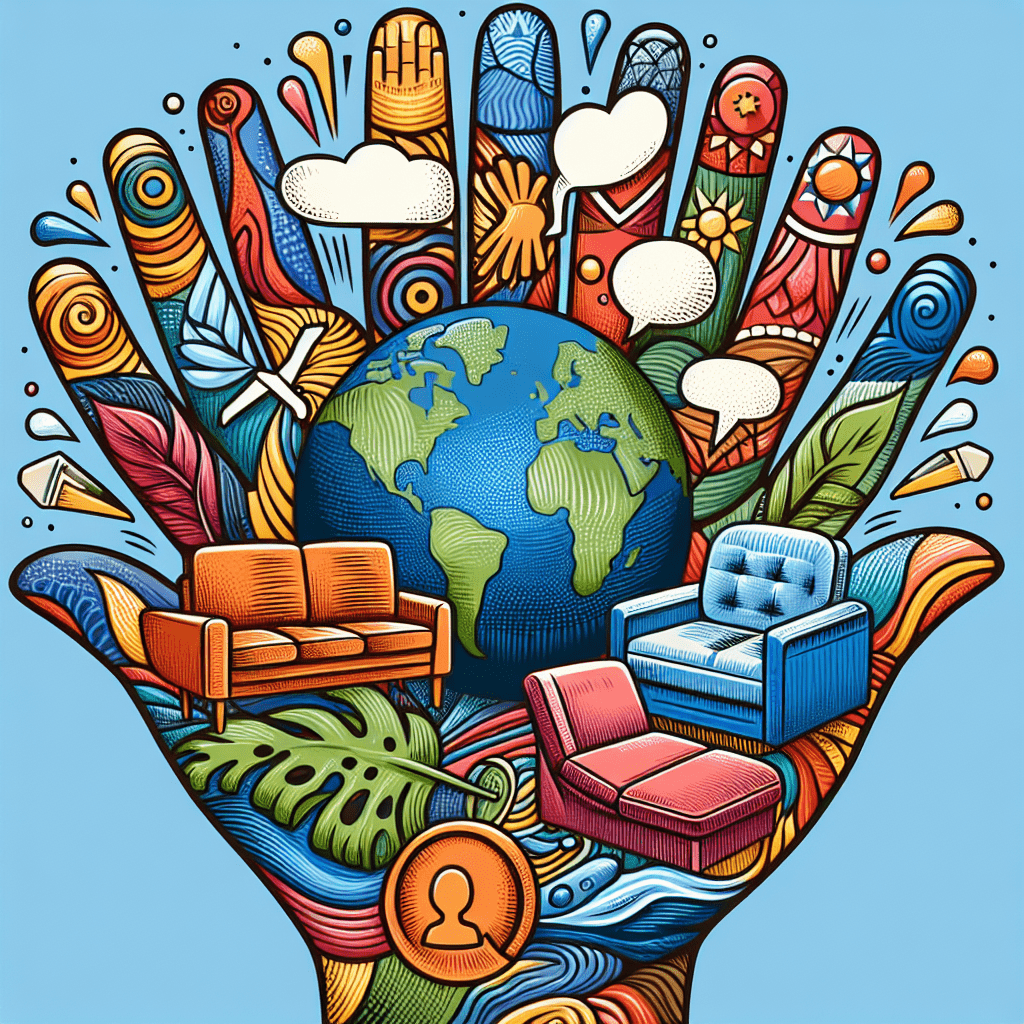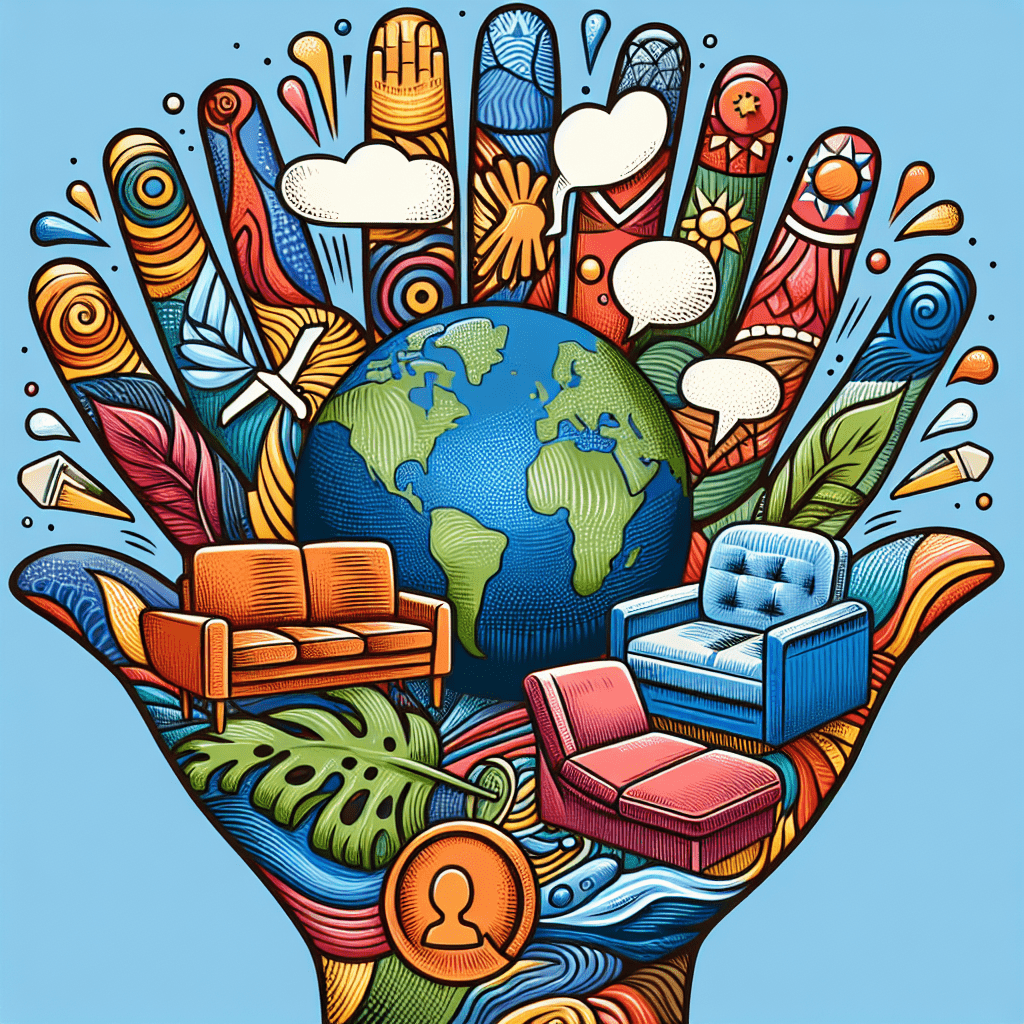In this article, you will explore how therapy services are tailored to meet the needs of individuals with diverse cultural backgrounds. With an ever-increasing multicultural society, it is essential for therapists to adapt their approach to ensure effective communication and understanding. By recognizing and respecting cultural differences, therapists can create a supportive and inclusive environment for clients to navigate their mental health challenges. Discover the various strategies and techniques employed to address cultural nuances in therapy, allowing clients to feel truly heard and seen.

Understanding the Importance of Cultural Competence in Therapy
Cultural competence in therapy is essential for providing effective and impactful mental health services to individuals from diverse cultural backgrounds. The impact of culture on mental health cannot be overlooked, as it influences our beliefs, values, and behaviors. When working with culturally diverse clients, understanding their cultural context, norms, and practices becomes paramount in understanding their mental health issues and formulating appropriate treatment plans.
The Impact of Culture on Mental Health
Culture plays a significant role in shaping our perceptions of mental health and well-being. Different cultures have unique ways of understanding and conceptualizing mental health issues. For example, in some cultures, mental health may be attributed to spiritual or supernatural causes, while in others, it may be viewed as a chemical imbalance in the brain. These cultural differences can greatly impact how individuals express and seek help for their mental health concerns. Therefore, therapists need to be aware of these cultural nuances to provide accurate diagnoses and appropriate interventions.
Barriers to Effective Therapy for Culturally Diverse Clients
Culturally diverse clients may face various barriers that hinder their access to effective therapy. Language barriers, cultural stigmas, mistrust of healthcare systems, and limited availability of culturally competent therapists are some of the common challenges they encounter. These barriers can discourage individuals from seeking help or prevent them from fully benefiting from therapy. It is crucial for therapists to address these barriers and create a safe and inclusive environment where individuals from all cultural backgrounds feel comfortable expressing themselves and receiving the support they need.
Benefits of Culturally Competent Therapy Services
Culturally competent therapy services have numerous benefits for both therapists and clients. When therapists are culturally competent, they can establish stronger therapeutic relationships with their clients, leading to increased trust and improved treatment outcomes. Culturally competent therapists can effectively navigate cultural differences, understand the unique needs and perspectives of their clients, and adapt therapeutic approaches accordingly. By incorporating culturally relevant interventions, therapists can provide more tailored and impactful treatment, ultimately leading to better mental health outcomes for their clients.
Cultural Adaptations in Therapy Approaches
Modifying traditional therapy techniques for cultural sensitivity is a crucial aspect of providing culturally competent therapy. Therapists should be flexible and willing to adapt their approaches to accommodate different cultural norms and practices. This may involve using different communication styles, incorporating cultural rituals or traditions, or modifying therapy goals to align with the client’s cultural values. By making these adaptations, therapists can ensure that their clients feel understood, validated, and supported throughout their therapeutic journey.
Incorporating Culture-Specific Interventions
Cultural competence also involves incorporating culture-specific interventions into therapy. These interventions acknowledge and leverage the strengths and resources within the client’s cultural background to promote healing and personal growth. For example, if a client comes from a collectivist culture where family support is highly valued, involving their family in the therapy process can enhance treatment outcomes. By utilizing culture-specific interventions, therapists can empower their clients and facilitate their journey towards emotional well-being.
Utilizing Culturally Tailored Assessment Tools
Assessment is an integral part of therapy, and it is essential to use culturally tailored assessment tools to ensure accurate and meaningful results. Standard assessment measures may not capture the full extent of a client’s experiences or may be influenced by cultural biases. Culturally tailored assessment tools take into account the cultural context, language, and beliefs of the client. By using these tools, therapists can obtain a more comprehensive understanding of their clients’ mental health concerns and provide appropriate interventions based on their individual needs.
Training and Education for Culturally Competent Therapists
Becoming a culturally competent therapist requires both formal education and ongoing professional development.
The Role of Formal Education in Culturally Competent Therapy
Formal education provides the foundation for therapists to develop cultural competence. Psychology programs and other mental health education curricula should incorporate courses specifically focused on multicultural counseling and cultural competency. These courses teach therapists about different cultural dynamics, the impact of culture on mental health, and strategies for providing culturally competent care. By acquiring this knowledge during their education, therapists can start their careers with a strong understanding of the importance of cultural competence and its application in therapy.
Continuing Education and Professional Development
Cultural competency is a lifelong learning process, and therapists must continuously engage in continuing education and professional development to enhance their cultural competence. Workshops, seminars, and conferences focused on cultural competency can provide therapists with opportunities to expand their knowledge and skills. These professional development activities allow therapists to stay updated with the latest research and best practices in culturally competent therapy. Additionally, therapists can benefit from participating in supervision and consultation groups, where they can discuss their experiences and receive guidance on providing culturally competent care.
Evaluating Cultural Competence in Therapists
It is important to evaluate and assess therapists’ cultural competence to ensure they are providing appropriate and effective care to diverse clients. Cultural competence assessments can be used to measure therapists’ knowledge, attitudes, and skills related to multicultural counseling. These assessments can help identify areas where therapists may need further training and support. By regularly evaluating cultural competence, therapists can continually improve their practice, provide high-quality care to all clients, and address any potential biases or blind spots they may have.
Strategies for Building Rapport with Culturally Diverse Clients
Building rapport is an essential aspect of therapy, and it becomes even more crucial when working with culturally diverse clients.
Developing Cultural Awareness and Self-Reflection
Developing cultural awareness and engaging in self-reflection is the first step in building rapport with culturally diverse clients. Therapists should take the time to explore their own biases, assumptions, and cultural background to better understand their potential impact on therapy. By being aware of their own cultural lens, therapists can approach clients with an open mind, free of judgment or preconceived notions. This self-awareness allows therapists to build trust with their clients and fosters a safe and accepting therapeutic environment.
Building Trust and Respect through Active Listening
Active listening is a fundamental skill in therapy, and it is particularly important when working with culturally diverse clients. By actively listening to their clients’ experiences, therapists demonstrate respect, validation, and genuine interest in understanding their unique perspectives. Additionally, therapists should be sensitive to nonverbal cues and understand that communication styles may vary across cultures. By practicing active listening and respecting their clients’ cultural communication styles, therapists can strengthen the therapeutic relationship and build trust.
Using Language and Communication Styles Appropriately
Language and communication styles are crucial considerations when working with culturally diverse clients. Therapists should ensure that language is not a barrier to effective therapy by providing language services or employing bilingual therapists. Additionally, therapists must be aware of cultural differences in communication styles, such as directness or different nonverbal cues. Adapting communication styles to align with the client’s cultural norms helps bridge potential communication gaps and ensures that therapy is effective and culturally sensitive.
Addressing Language and Communication Barriers in Therapy
Language and communication barriers can significantly impact the effectiveness of therapy for culturally diverse clients.
Providing Language Services and Bilingual Therapists
Language services, such as professional interpreters or multilingual therapists, play a vital role in overcoming language barriers. These resources enable therapists to effectively communicate with clients who may not speak the same language fluently. By providing language services, therapists ensure that all clients can fully express themselves and receive appropriate mental health support regardless of their language proficiency.
Using Professional Interpreters Effectively
When utilizing professional interpreters in therapy sessions, therapists must establish clear guidelines and expectations for both the interpreter and the client. It is crucial to ensure that interpreters are trained in mental health terminology and understand the importance of confidentiality and impartiality. By effectively utilizing professional interpreters, therapists can maintain the integrity of therapy sessions, preserve client trust, and ensure accurate communication between all parties involved.

Using Culturally Appropriate Communication Styles
Communication styles vary across cultures, and therapists should be sensitive to these variations. Some cultures may have a preference for indirect communication, while others may value directness. Therapists must adapt their communication styles to align with their client’s cultural preferences, ensuring that their messages are conveyed effectively and respectfully. By using culturally appropriate communication styles, therapists create a culturally competent therapeutic environment that fosters understanding and collaboration.
Considering Cultural Beliefs and Values in Therapy
Cultural beliefs and values have a profound impact on an individual’s well-being and should be integrated into therapy.
Understanding Cultural Norms and Practices
Therapists need to familiarize themselves with cultural norms and practices to better understand their clients’ perspectives and experiences. By gaining insights into a client’s cultural background, therapists can avoid misinterpreting behaviors or dismissing cultural practices as pathological. Understanding cultural norms provides therapists with a framework to guide their interventions and ensures that therapy aligns with the client’s cultural values.
Respecting and Integrating Cultural Beliefs into Therapy
Cultural beliefs are deeply ingrained in individuals’ lives and play a significant role in shaping their mental health experiences. Therapists should respect and honor these cultural beliefs, even if they differ from their own. By acknowledging the value of cultural beliefs and integrating them into therapy, therapists empower clients to draw on their cultural resources for healing and growth. This approach validates clients’ experiences and fosters a sense of cultural pride and self-acceptance.
Challenging Biases and Prejudices
Everyone holds biases and prejudices to some extent, and therapists are not exempt from this. In order to provide culturally competent care, therapists must actively challenge and confront their biases. This involves recognizing their own assumptions and stereotypes and being open to learning about cultures different from their own. By challenging biases and prejudices, therapists create an inclusive and non-judgmental therapeutic space where clients feel safe to explore their experiences without fear of discrimination or misunderstanding.
Navigating Cultural Taboos and Stigmatization
Cultural taboos and stigmatization can greatly impact individuals seeking therapy, particularly when the topic is sensitive or culturally sensitive.
Approaching Sensitive Topics with Cultural Sensitivity
Therapists need to approach sensitive topics with cultural sensitivity, taking into account the potential taboos or stigmas associated with these subjects. By acknowledging and respecting cultural sensitivities, therapists can create a safe space for clients to discuss potentially difficult or shameful topics. Therapists should use gentle and non-confrontational approaches, and allow clients to set the pace and comfort level for discussing sensitive matters.
Addressing Stigma and Shame within Cultural Context
Culturally competent therapists should address and challenge the stigmatization and shame associated with mental health issues within the cultural context. By educating clients and their families about mental health, therapists can help reduce stigma and promote a more accepting environment. Additionally, therapists can explore cultural practices or rituals that can be utilized to alleviate shame and promote healing. By addressing stigma and shame, therapists empower their clients and create an environment conducive to growth and well-being.
Creating a Safe and Non-Judgmental Environment
Creating a safe and non-judgmental environment is crucial for culturally diverse clients to feel comfortable and supported in therapy. Therapists should foster an atmosphere of acceptance, respect, and openness, where clients can freely express themselves without fear of judgment or discrimination. By creating a safe space, therapists promote trust and encourage clients to explore their identities, experiences, and mental health concerns authentically.
Involving the Family and Community in Therapy
Recognizing the significance of family and community is essential in providing culturally competent therapy.
Recognizing the Significance of Family and Community
In many cultures, the family and community play a significant role in an individual’s mental health and well-being. Recognizing and respecting this importance allows therapists to involve the client’s family and community in the therapy process effectively. By engaging the family and community, therapists can gain valuable insights and support for their clients, tapping into existing resources that can enhance the therapeutic journey.
Incorporating Family Systems Approaches
Family systems approaches focus on understanding the dynamics and interactions within families and how they contribute to an individual’s mental health. These approaches recognize the interconnectedness and interdependence of family members. Therapists can adopt family systems approaches to explore how the client’s cultural background and family dynamics may influence their mental health. By involving the family in therapy, therapists can promote healing not only for the individual but also for the entire family unit.
Collaborating with Community Leaders and Resources
Collaborating with community leaders and leveraging community resources is another crucial aspect of culturally competent therapy. Community leaders, such as religious or cultural elders, may hold considerable influence within cultural communities. By partnering with these leaders, therapists can gain cultural insights, build trust with the community, and enhance the effectiveness of therapy. Additionally, therapists can refer clients to community resources, such as support groups or culturally specific mental health services, to expand the support network and promote holistic well-being.
Culturally Competent Assessment and Diagnosis
Assessment and diagnosis should be conducted in a culturally competent manner to ensure accurate and meaningful results.
Considering Cross-Cultural Validity in Assessment Tools
Standard assessment tools may not always capture the full range of symptoms or experiences of individuals from diverse cultural backgrounds. Therapists must consider cross-cultural validity when selecting assessment tools and ensure that they are appropriate and relevant for individuals from different cultural backgrounds. By utilizing culturally validated assessment measures, therapists eliminate potential biases and ensure that their clients’ experiences are effectively captured and understood.
Recognizing Cultural Variations in Symptom Presentation
Cultural variations in symptom presentation must be recognized and understood to avoid misdiagnosis or misunderstanding. Mental health symptoms may be expressed differently across cultures, and therapists must be knowledgeable about these variations. By recognizing cultural variations and considering the cultural context, therapists can accurately diagnose and treat mental health conditions and avoid pathologizing cultural differences.
Avoiding Cultural Biases in Diagnosis
Cultural biases in diagnosis can lead to over-pathologization or under-diagnosis of certain populations. Therapists must be aware of their own cultural biases and how they may influence their diagnostic decisions. By practicing cultural humility, therapists can approach diagnostic processes with an open mind, free of personal biases. Additionally, therapists should collaborate with their clients, involving them in the diagnostic process and seeking their input regarding their own experiences and symptoms.
Empowering Clients through Culturally Competent Interventions
Empowerment is a central aspect of culturally competent therapy.
Tailoring Treatment Plans to Individual Cultural Needs
Culturally competent therapists tailor treatment plans to meet the individual cultural needs and preferences of their clients. This involves incorporating cultural beliefs, practices, and values into the therapeutic process. By aligning therapy goals and interventions with the client’s cultural context, therapists empower clients to embrace their cultural identity and utilize their cultural strengths for healing and personal growth.
Utilizing Culture-Specific Strengths and Resources
Culturally competent therapists recognize and utilize culture-specific strengths and resources to support their clients. Each culture possesses unique strengths and resources that individuals can draw upon for resilience and growth. By leveraging these strengths, therapists can empower clients to develop coping strategies and solutions that are meaningful and relevant within their cultural context. This approach enhances the client’s sense of agency and promotes self-efficacy in their journey towards well-being.
Promoting Empowerment and Self-Determination
Culturally competent therapy aims to promote empowerment and self-determination in clients. Therapists should actively involve clients in the decision-making process, honoring their autonomy and cultural values. By empowering clients to take an active role in their therapeutic journey, therapists foster a sense of ownership and confidence in their ability to overcome challenges. Culturally competent interventions prioritize the client’s agency, providing them with the support and tools they need to create positive change in their lives.
In conclusion, cultural competence in therapy is vital for providing effective, inclusive, and impactful mental health services to individuals from diverse cultural backgrounds. By understanding the impact of culture on mental health, addressing barriers to therapy, and implementing culturally competent strategies, therapists can ensure that all clients receive the support they need to thrive. Through ongoing training, self-reflection, and collaboration with families and communities, therapists can continually improve their cultural competence and provide high-quality care that respects and embraces the diverse experiences and needs of their clients.

